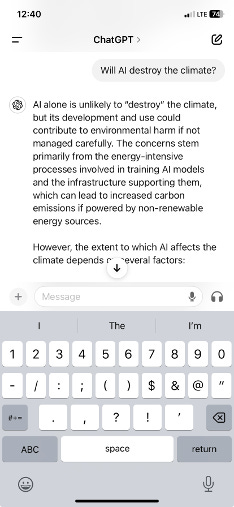Artificial intelligence underscores the need for carbon pricing
Artificial intelligence (AI) is here to stay. We don’t yet know if it will transform economy and society in the next five years or much later, but there is no turning back the clock. Just like the Luddites failed to halt mechanization, AI skeptics will not stop the progress of AI. Our future economic success depends too much on the productivity gains that AI promises.
For energy and climate, AI presents a challenge. The gargantuan data centers that support AI use have an insatiable thirst for energy. One estimate has each ChatGPT query consuming 10X the power required for a simple Google search. While this estimate is far from precise and continues to evolve as technology changes, it shows that AI will significantly increase electricity consumption.
The advent of AI is a perfect example of why we need carbon pricing. Without carbon pricing, the energy investments to power AI will be made in a haphazard and irresponsible way. We may end up with a surge in natural gas use or unnecessarily expensive clean energy capacity driven by a confused mess of tax credits, subsidies, and regulatory overreach.
I consumed some energy to ask ChatGPT whether artificial intelligence is good or bad for the climate. As usual, ChatGPT did not answer the question but instead enlightened me of pros and cons.
1. How carbon pricing works
The basic idea of carbon pricing is simple.
In the absence of carbon pricing, producers and consumers mostly ignore the climate pollution that their choices cause. Perhaps a tiny number of climate warriors will calculate their carbon footprint to deal with their existential dread, but most people will just search the web for the cheapest flights to Florida come spring break. Gym bros will continue to eat steak.
Under carbon pricing, producers and consumers will pay for these choices. If flights to Florida are all the sudden very expensive because the airline must pay the carbon price, some folks choose to celebrate spring break without aviation. And those who still choose to go to Florida pay for it, signaling that they value the experience enough to foot the bill. Gym bros will either pay more for their steak or downgrade to chicken or hemp protein.
Carbon pricing is magic. It gives producers and consumers the information they need to make better decisions. Of course, the carbon price must be high enough to make a difference, yet low enough not to ruin the economy. But this is something climate scientists and economists can figure out. Climate economics is a hot field in academia.
Carbon pricing does not solve all our problems. It does not encourage long-term innovation in key sectors. There is the question of what to do with the revenue from carbon pricing. But carbon pricing should be the foundation of energy and climate policy everywhere.
2. Carbon pricing applied to AI
AI is a good example of the virtues of carbon pricing.
AI is a new technology that is very difficult to value. We simply do not know how valuable it will be. As such, we are not able to make reasonable arguments for or against using massive amounts of energy to power AI.
We likely will not stop AI because it is our best hope to boost productivity in an aging society plagued by anti-immigrant sentiment. Now we need to figure out which energy sources should power AI, and to what extent.
This is an enormously complicated question. Any self-proclaimed expert who claims they know how to do this is wrong. The number of uncertain variables in repurposing our energy systems for the age of AI without ruining the planet is too high.
This is where carbon pricing enters the picture. If we have a carbon price that correctly reflects the damage from climate pollution, the resulting changes in energy prices give tech companies the information they need.
When a tech company sees the new energy prices with a carbon tax built-in, it can make an informed decision on whether a certain AI application makes sense.
If the AI application has promise, the tech company can investigate different energy options and choose one that makes sense. With a carbon tax, clean sources will be competitive because using fossil fuels comes with a hefty tax.
With a carbon price, tech companies will make decisions regarding AI as if they cared about the planet. They obviously do not, but with a carbon price that is fine. There is no need for existential dread. Properly structured, capitalism drives us toward net zero.
Our failure to institute carbon pricing is a key reason why our energy and climate policies are so complicated and expensive. Carbon pricing is politically difficult to pass, especially now that we live in an era of populism, but it is a worthy cause.


